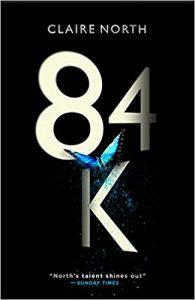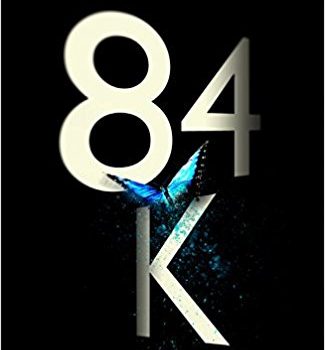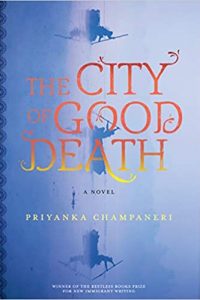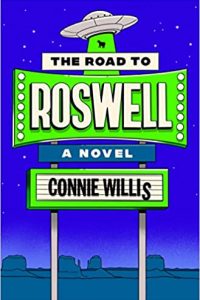Ian Mond Reviews 84K by Claire North
 84K, Claire North (Orbit 978-0316316804, $15.99, 480pp, tp) May 2018.
84K, Claire North (Orbit 978-0316316804, $15.99, 480pp, tp) May 2018.
Since 2014 Claire North has tapped into a rich vein of high concept speculative thrillers. Starting with The First Fifteen Lives of Harry August, each stand-alone novel has been framed around a straightforward “what if.” For example, what if there were people who, when they died, cycled back to the day they were born, but with all their memories intact? Or what if there was a woman that no-one could remember, not even her family? Or what if, with a single touch, you could roam between bodies? She continues this high-concept trend with her latest book, 84K: What if every crime, even murder, had a price tag?
Working for the Criminal Audit Office, Theo Miller’s job is to evaluate the monetary value of each offence that comes across his desk. If someone commits a crime, let’s say murder, and can’t pay the amount owed to the family of the slain, The Corporation sends them to the patty line – a euphemism for the most mind-numbing and, sometimes, life-threatening work. It wasn’t always like this: Theo remembers a time when the Government actively cared for its people through social programs and universal healthcare. However, when human rights were abolished (“the Government insisted it was necessary to counter terrorism and bring stable leadership to the country”), and The Corporation commercialised the Government’s responsibilities – starting with tax collection, and then covering every aspect of life – people became commodities ranked by their value.
Everything changes for Theo when he bumps into Dani, an old flame from his hometown, at a corporate retreat. She knows that Theo’s name isn’t Theo. Identity theft is, of course, a crime, one that Miller can’t afford, so he isn’t surprised when weeks after the retreat Dani blackmails him. She wants information about her daughter, Lucy, who has been sent to the patty-line because, while she’s barely a teenager, The Corporation still expects children to settle their accounts. After he discovers that Lucy might also be his child, and after witnessing Dani’s murder, an emboldened Theo, motivated to save his daughter, becomes a willing player in the overthrow of the Corporatocracy.
The linear story I’ve just described is not how North presents it. The novel opens with Neila, the owner of a narrowboat, finding Theo barely conscious and bleeding beside a canal. From that point on, past and the present blur into each other, a jigsaw puzzle of time and place that’s initially perplexing but soon occasions a poetic rhythm. It’s exciting to read a genre novel that’s willing to be this bold with language and structure, a fresh coat of paint on the non-linear narrative. It’s not just for show, either: this merging of the past and present underscores Theo’s one ambition – to provide his daughter with a future.
Theo might be our hero, but he’s not a likeable character. The guilt of his past – he blames himself for the death of the real Theo Miller – has made him selfish and inward looking. But even when he decides to stand-up to the system, it’s not the action of a selfless, idealistic hero, but a man obligated to save his daughter from the despair of the patty-line. He’s willing to selfishly sacrifice the lives of other people, even the leaders of the rebellion (what there is of it), to achieve his aims. As one character remarks, “How many mothers, daughters, sons and fathers have you killed, casually, as a senseless side effect of your crusade?”
Thank God then for Neila, the one person in this novel who acts for somebody other than herself. Most wouldn’t have assisted Theo; they’d have left his bloody body beside that canal. Neila’s instincts, the instincts of a transgender woman who has rejected a society that no longer recognises fundamental human rights, are that she also walk away. However, “at the precise moment she [decided to leave him]… she knew that she wouldn’t,” and with great difficulty and a courage Neila won’t acknowledge, she walks the staggering, barely conscious Theo back to her boat. Neila is the saving grace of North’s dystopia, the one shining light in a world that’s forgotten its humanity.
84K doesn’t pretend to be a convincing dystopia, but the society it depicts, especially when we consider the rapacious practices of Amazon and Facebook, or the ongoing arguments in America about raising the minimum wage, isn’t entirely unbelievable. For the people who live in this world, even the obscenely wealthy, there is no future, just feeding more bodies into the corporate machine and then burying the corpses in bottomless pits. 84K opens with a simple “what if,” but it quickly develops into a structurally inventive, sharply observed thought experiment about the gradual disappearance of our basic liberties and human rights.
This review and more like it in the July 2018 issue of Locus.
 While you are here, please take a moment to support Locus with a one-time or recurring donation. We rely on reader donations to keep the magazine and site going, and would like to keep the site paywall free, but WE NEED YOUR FINANCIAL SUPPORT to continue quality coverage of the science fiction and fantasy field.
While you are here, please take a moment to support Locus with a one-time or recurring donation. We rely on reader donations to keep the magazine and site going, and would like to keep the site paywall free, but WE NEED YOUR FINANCIAL SUPPORT to continue quality coverage of the science fiction and fantasy field.








